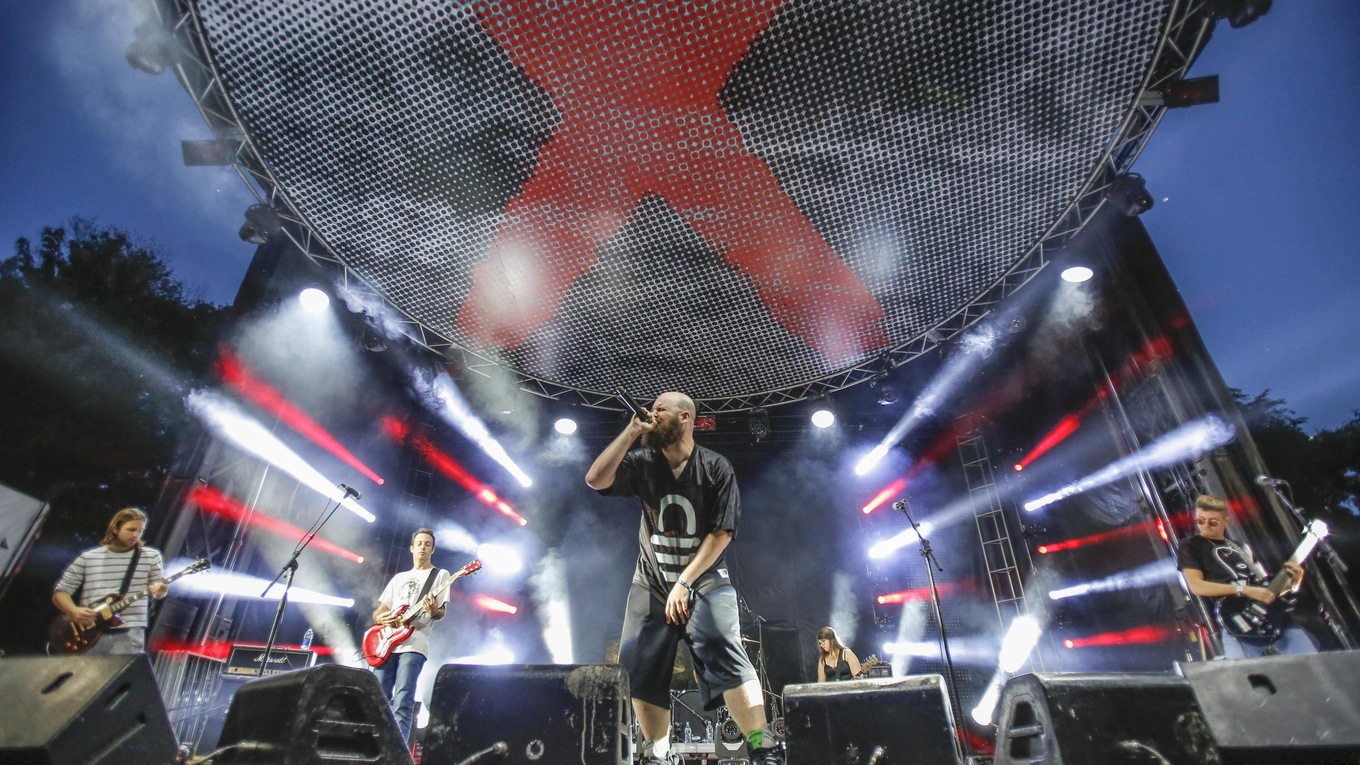Verses is a series in which we pair musicians together for an informal talk in the hopes that we will gain more insight into their lives, music and personalities. For the latest instalment, we paired Polaris Prize winners Tanya Tagaq and F--ked Up ahead of their first combined live performance. Below you’ll find an edited version of that conversation.
Tanya Tagaq admits she was shocked the first time she heard the instrumental to "Our Own Blood," her 2015 collaboration with Toronto hardcore godheads F--ked Up. Tagaq, who grew up a punk and metal devotee on the south coast of Nunavut's Victoria Island, was expecting a thrashing, growing sonic explosion, but instead received a 30-minute work of subtle beauty.
A year later, the Inuk throat singer and the experimental rockers, who have surprisingly never met in person, are aiming to recreate "Our Own Blood" live for the first time as part of the Red Bull Music Academy in Montreal.
We introduced Tagaq to F--ked Up’s Mike Haliechuk at CBC’s Toronto HQ. Below they discuss the thrill of collaboration, their musical convergence and the challenge of performing improvised music live.
Mike Haliechuk: We just met 30 seconds ago. You've hung out with Damian [Abraham, lead singer] maybe?
Tanya Tagaq: One time at 420.
Haliechuk: I saw you when you played with Doomsquad at the Great Hall maybe two years ago.
Tagaq: Oh, I love those guys.
Haliechuk: I never go to shows really, but that show's so sick and we had this weird improvisational piece and thought that your vocals would be perfect on it. So I think we just hit you up and that's how it happened.
Tagaq: Also, I've liked their music for a long time so it was really awesome to do that piece together. Even just the way it sounded, there was a certain delicacy or a vulnerability in the sound. I know this sounds really cheesy but there was a caring about noise, about sound, about the process. We have our own realities that we live in, and our own territory musically, and when you collaborate all of a sudden you're pushed into this whole new territory that you couldn't have possibly gotten to alone. The piece itself, I was really happy with.
Haliechuk: We didn't really have any sort of a plan when we sat in but I think we sort of ended up writing it for you to be on.
Tagaq: Awww.
Haliechuk: When we [started writing] we had no idea what we were going to do so we were like, "Well, we're going to do this weird jam thing and Tanya's going to sing on it," so that was in our heads while we were recording it.
Tagaq: It's probably from that release that sparked the interest in us to perform live. And it's funny because I'm only an improviser so I'm going to have to find some way to bridge a gap where everybody feels comfortable.
Haliechuk: Yeah, we've never done anything like this before live. We sound like a jammy band but we don't really jam and we don't really work on our "chops" while we're practising so it's going to be fun. I'll say that.
Tagaq: The way I usually work is you guys have a thing and I just do anything over the thing.
Haliechuk: Yeah, that's a good plan.
Tagaq: I think sometimes non-improvisers will see me as pretty lazy and it's kinda true. I'm just lazy. And through that laziness or this weird insecurity about "What if you do the best one at the practice?" You want to catch that live energy during the performance.
Haliechuk: So how do you do takes when you're recording?
Tagaq: Nothing happens the same more than once.
Haliechuk: So how do you figure out which is the best one to keep?
Tagaq: We listen. The album process is you just go and do a whole bunch of improvising and you pick parts that you like and you can build upon those because you don't have that luxury with an audience. But I'm glad I'm being pushed into different parameters.
Haliechuk: Yeah, us too.
Tagaq: It's fun to be challenged. Like I just did this song with Shad and we recorded it for CBC First Play Live and we had to do a song for the first time that was a real song. And it was so fun doing something where you knew what was going to happen [next]. It was like putting a warm blanket on. It's not scary anymore.
Haliechuk: It's fun for the first five years and then the next five years, less fun, and the next five years is kinda boring.
Tagaq: So what would happen if you had some weird strife and you wrote this song about how you were feeling at the moment and then five years later you're over [it] and you're so annoyed that you have to keep playing this song that is indicative of who you used to be?
Haliechuk: That does happen. I think the trick is, if you're going to do that, you have to make sure your songs are behind so many layers of irony and sarcasm that they always ring true because you're so far behind what they meant 15 years ago. Because we play songs from the year 2001 still.
Tagaq: Oh really. Oh wow.

Haliechuk: Yeah, but our songs are more sentiment rather than content. A punk song is always going to be true to that forever. So as long as there's that kind of character in a song.... Also the music is more important for us. The way the drums and the guitar sound have a lot of value, too.
Tagaq: That's why I was so shocked at our collaboration because I thought it was going to be [imitates Damian's growling noise], something a little more ramped up. But it was very relaxed and had a beautiful calmness to it.
Haliechuk: That's how we all are inside.
Tagaq: Yeah, we're pretty chill all around this end, too. I think sometimes people meet for a reason and people collaborate for a reason because it's intimate playing music together. When you've been around for years it's so lovely because I don't have to play with anyone I don't want to play with ever again. You learn that. I'm careful about collaborations because it's so intimate. You're sharing creativity and we rip ourselves open and suffer needlessly for music. You suffer needlessly overscheduling and touring, it grinds you down, but we love what we do. We sacrifice for our music all the time so it's just nice when something comes together that makes sense.
Haliechuk: Our two things make sense together because it seems we come from the same place. The music has power and confidence and that's the way we've carried it through our career. Our version of punk was always that: dealing with things in the world but being in front of them rather than being behind them. And I feel like that's where you're coming from, too.
Tagaq: I get very happy when anyone refers to me as a punk musician. I was young in the '80s and very much enjoyed the darker edge of that scene. Plus I always really loved metal. I remember growing up in the middle of nowhere in Nunavut and when I was so cold, -40, -50, and we made this lip-sync band called the Parkas and we all put on our huge parkas and we'd blast metal music and pretend we were musicians. The Parkas, it was amazing! Certain genres of music are easily taken on by people in Nunavut, like hip-hop makes sense because there was a lot of strife happening around us. Or under my circumstance, when people are very angry, [punk/metal] is such a good outlet. So it began as being an outlet but then the nuance of the genre took on its own life. It's difficult to categorize your and my music, but "punk" just exemplified angry young people to me. And it applies very well to my circumstance. Except I'm angry and old now.

